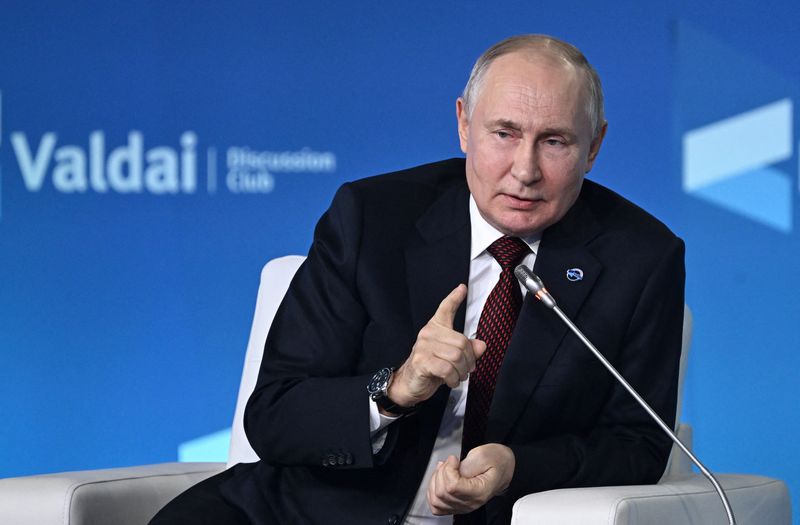By Guy Faulconbridge
MOSCOW (Reuters) - President Vladimir Putin on Thursday declined to rule out that Russia might resume nuclear testing, saying it could withdraw ratification of a landmark nuclear test ban treaty, and confirmed Russia had tested a nuclear-powered cruise missile.
What is Russia's nuclear arsenal, how big is it and who commands it?
NUCLEAR SUPERPOWER
Russia, which inherited the Soviet Union's nuclear weapons, has the world's biggest store of nuclear warheads.
Putin controls around 5,889 such warheads as of 2023, compared with 5,244 controlled by U.S. President Joe Biden, according to the Federation of American Scientists.
Around 1,400 of those Russian warheads are retired but probably still intact, 2,815 are in reserve and around 1,674 are deployed strategic warheads.
The United States has around 1,670 deployed strategic nuclear warheads. China has a total of 410 warheads, France 290 and Britain 225, according to the Federation.
Such numbers mean that both Moscow and Washington could destroy the world many times over.
During the Cold War, the Soviet Union had a peak of around 40,000 nuclear warheads, while the U.S. peak was around 30,000.
NEWER NUKES
The United States said in its 2022 Nuclear Posture Review that Russia and China were expanding and modernising their nuclear forces, and that Washington would pursue an approach based on arms control to head off costly arms races.
Putin said on Thursday that Russia had successfully tested a potent new strategic cruise missile capable of carrying nuclear warheads, the nuclear-powered Burevestnik, and almost completed work on its Sarmat intercontinental ballistic missiles, each capable of carrying ten or more nuclear warheads.
TESTING
Since the Soviet Union collapsed in 1991, only a few countries have tested nuclear weapons, according to the Arms Control Association: The United States last tested in 1992, China and France in 1996, India and Pakistan in 1998, and North Korea in 2017.
The Soviet Union last tested in 1990.
The Comprehensive Nuclear-Test Ban Treaty was signed by Russia in 1996 and ratified in 2000. The United States signed the treaty in 1996 but has not yet ratified it.
WHO WOULD GIVE THE RUSSIAN LAUNCH ORDER?
The Russian president is the ultimate decision maker when it comes to using Russian nuclear weapons, both strategic and tactical, according to Russia's nuclear doctrine.
The doctrine allows for a nuclear strike after "aggression against the Russian Federation with conventional weapons when the very existence of the state is threatened".
The so-called nuclear briefcase, or "Cheget" (named after Mount Cheget in the Caucasus Mountains), is with the president at all times. The Russian defence minister, currently Sergei Shoigu, and the chief of the general staff, currently Valery Gerasimov, are also thought to have such briefcases.
Essentially, the briefcase is a communication tool that links the president to his military top brass and thence to rocket forces via the highly secret "Kazbek" electronic command-and-control network. Kazbek supports another system known as "Kavkaz".
Footage shown by Russia's Zvezda television channel in 2019 showed what it said was one of the briefcases with an array of buttons. In a section called "command" there are two buttons: a white "launch" button and a red "cancel" button. The briefcase is activated by a special flashcard, according to Zvezda.

If Russia thought it faced a strategic nuclear attack, the president, via the briefcases, would send a direct launch order to general staff command and reserve command units that hold nuclear codes. Such orders cascade swiftly down different communications systems to strategic rocket force units, which then fire at the United States and Europe.
If a nuclear attack were confirmed, Putin could activate the so-called "Dead Hand" or "Perimetr" system of last resort: essentially computers would decide doomsday. A control rocket would order nuclear strikes from across Russia's vast armoury.